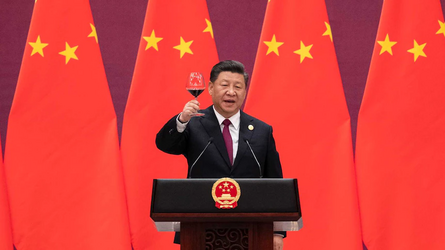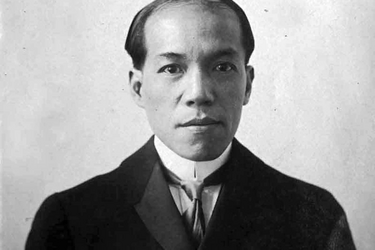By Stan Grant
Posted Sat 15 Oct 2022 at 6:00pm

In some ways, Xi's China may represent the end of whiteness. Except that the Chinese Communist Party itself mirrors whiteness.(AP: Nicolas Asfouri, pool)
It is not possible to understand China without understanding race and racism. Specifically, without understanding whiteness.
Yet far too often the conversation around the rise of this new superpower is in predominantly geo-political terms, about authoritarianism versus democracy, about human rights — or whether we will go to war.
But race sits at the heart of it all.
We were reminded this week when China described the AUKUS agreement — between Australia, the UK and the US – as a race-based military bloc of white countries.
China's Ambassador to Australia, Xiao Qian, says that's how it appears to people in other countries. What he means are non-white countries.

China’s ambassador to Australia, Xiao Qian, characterised the AUKUS agreement as a race-based military bloc of white countries.(ABC New: Ian Cutmore)
Yes, that humiliation was at the hands of the Japanese, too, but the Japanese themselves cannot be separated from the project of whiteness.
In his book, Becoming Yellow: A Short History of Racial Thinking, scholar Michael Keevak traces how the Chinese stopped being white.
He says in early interaction between Europeans and Asians, the Chinese were actually described as white.

A deep racial consciousness runs through the Chinese Communist Party. (AP: Ng Han Guan)
This was before racialised thinking was popularised in the 18th century.
It was then that scientists started to divide the world up into groupings of colour. Colour denoted civilisation. At the top were white Europeans, at the bottom black people and all others, graded on a sliding scale.
Keevak says Asians — including the Chinese and Japanese — began to "darken".
They lost their whiteness, he says, "when it became clear they would remain unwilling to participate in European systems of trade, religion and international relations".
The fall of the Qing Empire in the 19th century hastened a racial reckoning for the Chinese.
This was a dark night of the soul; it would tip China into a century of upheaval, revolution, and violence on an industrial scale.
And it also brought China face-to-face with white power. The Qing Empire was humbled by Britain, a tiny island that now occupied Chinese territory.
Nineteenth-century writer Yan Fu was influenced by European liberal thinkers, such as John Stuart Mill and the father of economics Adam Smith, and saw China's future emulating Western liberalism.
Perhaps the most influential thinker of all, Liang Qichao, also looked to the Western idea of history as a march of progress — and progress meant modernisation.
Liang is known as the godfather of Chinese nationalism whose acolytes included the Chinese Communist revolutionary leader, Mao Zedong.
He coined the phrase "the sick man of Asia" to refer to China's fallen state. He said they were awoken from a thousand-year-long dream.
As Liang embraced Western ideas, he also advocated for the unity of the "yellow race". He used the term "minzu" to describe the people of the nation.
The seeds of resentment were sown.
Historian Jerome Ch'en writes: "From 1842 to 1942, China had been treated by the West with distrust, ridicule, and disdain…"
Liang Qichao — who had looked to the West — now turned sour. He was an official observer in Paris, but returned believing that following the West would lead China to catastrophe.
At the same time, the world was warning of the "yellow peril".

Liang Qichao is known as the godfather of Chinese nationalism.(Wikimedia Commons)
Australia had its own whites-only policy, excluding non-white races from the country.
Racial politics was also shaping China's great foe, Japan.
The Japanese derided the Chinese as "yellow". As Michael Keevak points out, Japan saw itself on par with Western powers.
Its imperialism mirrored the imperialism of white colonisers.
In the West, the Japanese were still seen as "coloured people", Keevak says, but "maybe not as yellow as the Chinese".
For the past three centuries, power and whiteness have been synonymous. From the British Empire to the American century, white nations have exported violence, committed genocide, stolen land and made it all legal.
China, like so many other non-white nations, has felt the sting of white imperialism.
His military strategies have been adopted by the Viet Cong, the Taliban, Al Qaeda and Islamic State.
Deng Xiaoping travelled to Europe as a young man and saw the racial discrimination against Chinese people. His economic revolution was built on beating the West at its own game.
Xi Jinping lectures the West on its own hypocrisy. He is still fighting the Opium Wars against Britain, the fall of the Qing — the great humiliation. His dream is to return China to the apex of global power.
China today is seen as a threat to the West. A threat to the so-called global rules-based order that is itself rooted in a race-based order.
So much of the commentary around China ignores the question of race. So many of the commentators discussing China — predominantly white voices — do not have the racial literacy to begin to understand how race and racism inform China's rise.
In some ways, Xi's China may represent the end of whiteness. Except that the Chinese Communist Party itself mirrors whiteness.
The irony is Xi has also become what he opposes. He is a Han nationalist — his idea of Chinese power is ethnic Han superiority — persecuting non-Han, non-white people in his own country.
If whiteness is power, Xi Jinping is its champion.
The continuation of white power, in darker skin.
Source (Archive)
Posted Sat 15 Oct 2022 at 6:00pm

In some ways, Xi's China may represent the end of whiteness. Except that the Chinese Communist Party itself mirrors whiteness.(AP: Nicolas Asfouri, pool)
It is not possible to understand China without understanding race and racism. Specifically, without understanding whiteness.
Yet far too often the conversation around the rise of this new superpower is in predominantly geo-political terms, about authoritarianism versus democracy, about human rights — or whether we will go to war.
But race sits at the heart of it all.
We were reminded this week when China described the AUKUS agreement — between Australia, the UK and the US – as a race-based military bloc of white countries.
China's Ambassador to Australia, Xiao Qian, says that's how it appears to people in other countries. What he means are non-white countries.

China’s ambassador to Australia, Xiao Qian, characterised the AUKUS agreement as a race-based military bloc of white countries.(ABC New: Ian Cutmore)
A history of humiliation
The Chinese Communist Party has a deep racial consciousness. It is there in the reminder to its people never to forget the hundred years of humiliation at the hands of foreign powers — of white powers.Yes, that humiliation was at the hands of the Japanese, too, but the Japanese themselves cannot be separated from the project of whiteness.
In his book, Becoming Yellow: A Short History of Racial Thinking, scholar Michael Keevak traces how the Chinese stopped being white.
He says in early interaction between Europeans and Asians, the Chinese were actually described as white.

A deep racial consciousness runs through the Chinese Communist Party. (AP: Ng Han Guan)
This was before racialised thinking was popularised in the 18th century.
It was then that scientists started to divide the world up into groupings of colour. Colour denoted civilisation. At the top were white Europeans, at the bottom black people and all others, graded on a sliding scale.
Keevak says Asians — including the Chinese and Japanese — began to "darken".
They lost their whiteness, he says, "when it became clear they would remain unwilling to participate in European systems of trade, religion and international relations".
The fall of the Qing Empire in the 19th century hastened a racial reckoning for the Chinese.
This was a dark night of the soul; it would tip China into a century of upheaval, revolution, and violence on an industrial scale.
And it also brought China face-to-face with white power. The Qing Empire was humbled by Britain, a tiny island that now occupied Chinese territory.
Nineteenth-century writer Yan Fu was influenced by European liberal thinkers, such as John Stuart Mill and the father of economics Adam Smith, and saw China's future emulating Western liberalism.
Perhaps the most influential thinker of all, Liang Qichao, also looked to the Western idea of history as a march of progress — and progress meant modernisation.
Liang is known as the godfather of Chinese nationalism whose acolytes included the Chinese Communist revolutionary leader, Mao Zedong.
He coined the phrase "the sick man of Asia" to refer to China's fallen state. He said they were awoken from a thousand-year-long dream.
As Liang embraced Western ideas, he also advocated for the unity of the "yellow race". He used the term "minzu" to describe the people of the nation.
Seeds of resentment and 'yellow peril'
World War I was another reckoning. At the Paris peace talks, China felt abandoned. German-occupied Chinese territory was not handed back to China but to Japan.The seeds of resentment were sown.
Historian Jerome Ch'en writes: "From 1842 to 1942, China had been treated by the West with distrust, ridicule, and disdain…"
Liang Qichao — who had looked to the West — now turned sour. He was an official observer in Paris, but returned believing that following the West would lead China to catastrophe.
At the same time, the world was warning of the "yellow peril".

Liang Qichao is known as the godfather of Chinese nationalism.(Wikimedia Commons)
Australia had its own whites-only policy, excluding non-white races from the country.
Racial politics was also shaping China's great foe, Japan.
The Japanese derided the Chinese as "yellow". As Michael Keevak points out, Japan saw itself on par with Western powers.
Its imperialism mirrored the imperialism of white colonisers.
In the West, the Japanese were still seen as "coloured people", Keevak says, but "maybe not as yellow as the Chinese".
For the past three centuries, power and whiteness have been synonymous. From the British Empire to the American century, white nations have exported violence, committed genocide, stolen land and made it all legal.
China, like so many other non-white nations, has felt the sting of white imperialism.
The end of whiteness?
Chinese leaders have seen their struggle in racial terms. Mao Zedong styled himself as a revolutionary leader of the non-white world.His military strategies have been adopted by the Viet Cong, the Taliban, Al Qaeda and Islamic State.
Deng Xiaoping travelled to Europe as a young man and saw the racial discrimination against Chinese people. His economic revolution was built on beating the West at its own game.
Xi Jinping lectures the West on its own hypocrisy. He is still fighting the Opium Wars against Britain, the fall of the Qing — the great humiliation. His dream is to return China to the apex of global power.
China today is seen as a threat to the West. A threat to the so-called global rules-based order that is itself rooted in a race-based order.
So much of the commentary around China ignores the question of race. So many of the commentators discussing China — predominantly white voices — do not have the racial literacy to begin to understand how race and racism inform China's rise.
In some ways, Xi's China may represent the end of whiteness. Except that the Chinese Communist Party itself mirrors whiteness.
The irony is Xi has also become what he opposes. He is a Han nationalist — his idea of Chinese power is ethnic Han superiority — persecuting non-Han, non-white people in his own country.
If whiteness is power, Xi Jinping is its champion.
The continuation of white power, in darker skin.
Source (Archive)

